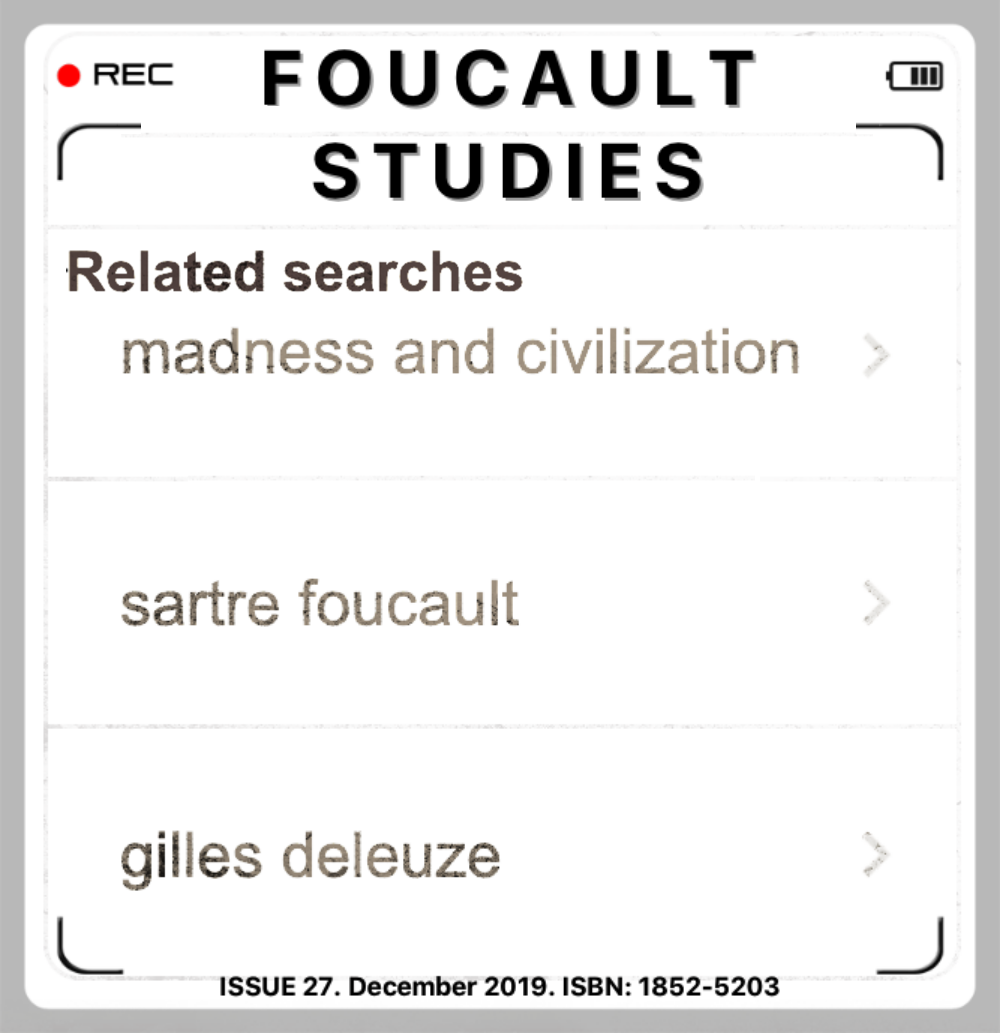Re-thinking Thought: Foucault, Deleuze, and the Possibility of Thinking
DOI:
https://doi.org/10.22439/fs.v27i27.5891Resumé
This paper examines how Foucault and Deleuze understand each other’s work, arguing that they are united in their common endeavour to make it possible to think again. Focusing on Foucault’s ‘Theatrum Philosophicum’ and Deleuze’s Foucault, it shows how each of Foucault and Deleuze considers the other as someone who opens anew the possibility of thinking. The first section examines Deleuze’s interpretation of Foucault’s work. It demonstrates that, despite sounding as if he is elucidating his own philosophy, Deleuze is correct in saying that Foucault re-thinks thought by positing the disjunction between the articulable and the visible, among other things. Turning to Foucault’s review of Deleuze’s works, the second section explains why Foucault deems Deleuze’s notion of thought as a disjunctive affirmation. By underscoring the disjunctive role ‘and’ plays in the disjunctive affirmation of ‘the event and the phantasm’ and/or of thought itself and its object, Foucault considers Deleuze as someone who re-thinks thought not by conceptualising it but by thinking difference. The paper concludes that, while each endeavours to consider thought in a new light, both Foucault and Deleuze believe that the other makes it possible to think again.
Referencer
Deleuze, Gilles, Foucault [1986]. London and New York: Continuum, 1999.
Deleuze, Gilles, and Michel Foucault, “Intellectuals and Power: A Conversation between Michel Foucault and Gilles Deleuze” [1972], in Language, Counter-memory, Practice: Selected Essays and Interviews, ed. Donald Bouchard, 205-217. New York: Cornell University Press, 1996.
Dosse, François, “Deleuze and Foucault: A Philosophical Friendship,” in Between Deleuze and Foucault, ed. Nicolae Morar, Thomas Nail and Daniel W. Smith, 11-37. Edinburgh: Edinburgh University Press, 2016. http://www.jstor.org/stable/10.3366/j.ctt1g052qn.5.
Dreyfus, Hubert, and Paul Rabinow, Michel Foucault. Beyond Structuralism and Hermeneutics, 2nd ed. Chicago: The University of Chicago Press, 1983.
Foucault, Michel, The Order of Things. An Archaeology of the Human Sciences [1966]. London: Tavistock Publications Limited, 1970.
Foucault, Michel. The Care of the Self. The History of Sexuality, vol. 3 [1984]. New York: Vintage Books, 1988.
Foucault, Michel, Discipline and Punish. The Birth of the Prison [1975]. New York: Vintage Books, 1995.
Foucault, Michel, “Theatrum Philosophicum” [1970], in Aesthetics, Method, and Epistemology, ed. James Faubion, 343-368. New York: The New Press, 1998.
Foucault, Michel, “Theatrum Philosophicum” [1970], in Dits et Écrits, 1954-1988, ed. Daniel Defert and François Ewald, 943-967. Paris: Quarto Gallimard, 2001.
Foucault, Michel, The Archaeology of Knowledge [1969]. London and New York: Routledge Classics, 2002.
Foucault, Michel, Death and the Labyrinth. The World of Raymond Roussel [1964]. London and New York: Continuum, 2004.
Foucault, Michel, “What is Enlightenment?” [1984], in The Politics of Truth, ed. Sylvère Lotringer, 97-119. Los Angeles: Semiotext(e), 2007.
Foucault, Michel, Introduction to Kant’s Anthropology [1961]. Los Angeles: Semiotext(e), 2008. Foucault, Michel, The Will to Knowledge. The History of Sexuality, vol. 1 [1976]. Camberwell: Penguin Books, 2008.
Grace, Wendy, “Faux Amis: Foucault and Deleuze on Sexuality and Desire,” Critical Inquiry 36:1 (2009), 52-75: https://doi.org/10.1086/606122.
Hand, Seán, “Translating Theory, or the Difference between Deleuze and Foucault,” in Foucault, vii-x. London and New York: Continuum, 1999.
Kant, Immanuel, Critique of Pure Reason [1781]. Cambridge: Cambridge University Press, 1998.
Kelly, James, “Towards a Deleuzian Theory of Translation,” Deleuze Studies 11:3 (2017), 379- 404. https://doi.org/10.3366/dls.2017.0273.
Koopman, Colin, Genealogy as Critique. Foucault and the Problems of Modernity. Bloomington and Indianapolis: Indiana University Press, 2013.
Lawlor, Leonard, and Janae Sholtz, “Speaking Out For Others: Philosophy’s Activity in Deleuze and Foucault (and Heidegger),” in Between Deleuze and Foucault, ed. Nicolae Morar, Thomas Nail and Daniel W. Smith, 139-159. Edinburgh: Edinburgh University Press, 2016. http://www.jstor.org/stable/10.3366/j.ctt1g052qn.12.
Morar, Nicolae, and Marjorie Gracieuse, “Against the Incompatibility Thesis: A rather Different Reading of the Desire-Pleasure Problem,” in Between Deleuze and Foucault, ed. Nicolae Morar, Thomas Nail and Daniel W. Smith, 232-246. Edinburgh: Edinburgh University Press, 2016. http://www.jstor.org/stable/10.3366/j.ctt1g052qn.18.
Morar, Nicolae, Thomas Nail, and Daniel W. Smith, “Introduction,” Foucault Studies 17 (2014), 4-10. https://rauli.cbs.dk/index.php/foucault-studies/article/view/4249/4675.
Patton, Paul, “Activism, Philosophy and Actuality in Deleuze and Foucault,” Deleuze Studies 4 (2010), 84-103. https://doi.org/10.3366/E1750224110001145.
Purdue University, “Course Transcriptions: Deleuze’s seminars on Foucault,” 2018. Accessed 1 May 2018. https://www.cla.purdue.edu/research/deleuze/Course%20Transcriptions.html.
Thompson, Kevin, “Foucault and the ‘Image of Thought’: Archaeology, Genealogy, and the Impetus of Transcendental Empiricism,” in Between Deleuze and Foucault, ed. Nicolae Morar, Thomas Nail and Daniel W. Smith, 200-211. Edinburgh: Edinburgh University Press, 2016. http://www.jstor.org/stable/10.3366/j.ctt1g052qn.15.
Université de Paris 8, “La Voix de Gilles Deleuze en ligne,” 2011. Accessed 1 April 2018. http://www2.univ-paris8.fr/deleuze/rubrique.php3?id_rubrique=21.
Downloads
Publiceret
Citation/Eksport
Nummer
Sektion
Licens
Authors retain copyright to their work, but assign the right of the first publication to Foucault Studies. The work is subject to a CC BY-NC-ND 4.0 license, but despite these restrictions, authors can take for granted that Foucault Studies will permit articles published in Foucault Studies to be translated or reprinted in another format such as a book providing a full reference is made to Foucault Studies as the original place of publication.



